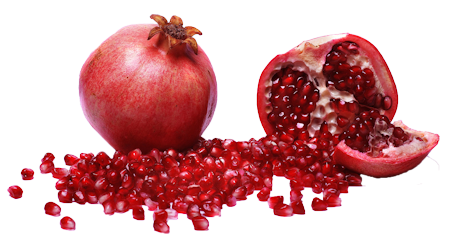|
The health benefits of pomegranate are
innumerable. Apart from being healthy, pomegranates are delicious as well.
Pomegranates also have antioxidant, antiviral and antitumor properties. They
are said to be good sources of vitamins, since it includes vitamin A, vitamin
C, and vitamin E, as well as folic acid.
This fruit consists of three times as many antioxidants as both wine or
green tea. It is said to be a healthy
powerhouse.
Stomach Disorders: Pomegranate peel, bark and leaves are used to calm disorders of
the stomach or the diarrhoea caused by any kind of digestive problems. Drinking
tea made from the leaves of this fruit also helps in curing your digestive
problems. Pomegranate juice is also used for handling problems like dysentery
and cholera.
Heart Problems: Regular intake of pomegranate juice can maintain good flow of
the blood in the body. Because of this property, it subsequently decreases the
risk of heart attacks and strokes. The antioxidant components that are
contained in this fruit help to keep the bad cholesterol from gaining any
significant presence and thus keeps the arteries clear of any clots. The clots
are clear because pomegranates have the ability to make the blood thinner.
Cancer: Pomegranates contain high levels of antioxidants called flavonoids.
These flavonoids are known to be effective in counteracting various cancer
radials. People that face high risk of prostate and breast cancer should start
drinking the juice of this fruit, as it will help them to reduce the risk of
developing cancer. Regular consumption of pomegranates can reduce the PSA
levels in the body and aid in the fight against existing cancer cells in the
body.
Dental Care: One of the best benefits of pomegranates is that their juice,
along with its antibacterial and antiviral properties, helps to reduce the
effects of dental plaque and protects against various oral diseases.
Osteoarthritis: Pomegranates help reduce illnesses of many forms, including
atherosclerosis and osteoarthritis. The damages that are caused due to the thickening
and hardening of the arterial walls and in the cartilage and joints can be
cured by eating this fruit. Also, pomegranates are capable of preventing the
creation of enzymes that are responsible for breaking down connective tissues
within the body.
Anaemia: Healthy blood flow can be maintained in the body by consuming
this fruit in any form. Pomegranate supplies iron to the blood, thus helping to
reduce symptoms of anaemia, including exhaustion, dizziness, weakness, and
hearing loss.
Diabetes: For diabetic patients, drinking pomegranate juice can reduce the
risk of various coronary diseases. Along with this, there is a reduction in the
hardening of the arteries, which can inhibit the development of various heart
diseases.
Other Benefits: Over time, more and more people have started to realize the
importance of eating pomegranates. There are other benefits of eating this
fruit as well, like reducing the possibility of having premature babies and
avoiding low birth weight for new-born infants.
Pomegranates also reduce the possibility of
developing Alzheimer’s disease among older generations. It helps to control
aging problems like wrinkles as well, thus providing people with youthful and
glowing skin. Other than this, it can help women overcome depression symptoms
during her period, especially post-menopausal depression.
|

